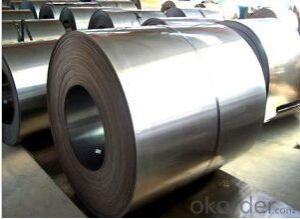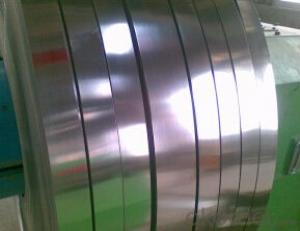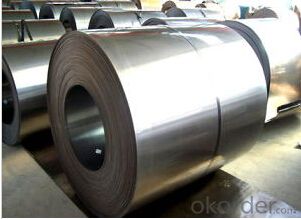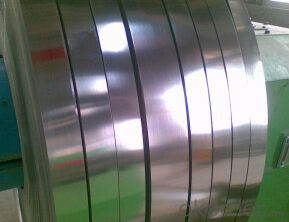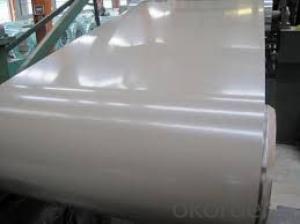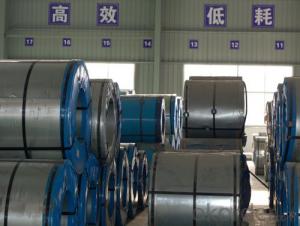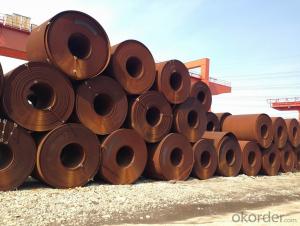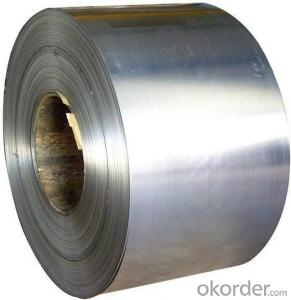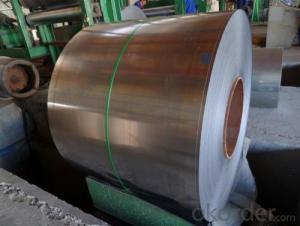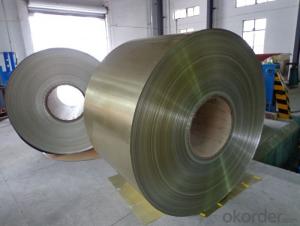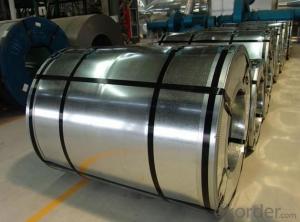Alloy Rolled Steel Coil for Machinery Parts
- Loading Port:
- Tianjin
- Payment Terms:
- TT OR LC
- Min Order Qty:
- 25 m.t.
- Supply Capability:
- 10000 m.t./month
OKorder Service Pledge
OKorder Financial Service
You Might Also Like
Description Info.
Model NO.:15CrMo/20CrMo/30CrMo/40CrMo/50CrV4/60Si2Mn/65Mn
Type:All Above
Standard:AISI, ASTM, DIN, JIS, GB, BS
Technique:All Above
Surface Treatment:Polished
Composition:All Above
Steel Grade:Grade a
Special Use:All Above
Shape:Coil Plate Strips etc.
Application:All Above
Size:0.18mm-5.0mm
Export Markets:Global
Additional Info.
Trademark:Shanghai Yunhan Steel
Packing:Standard Export Packing
Standard:SGS
Origin:China
HS Code:72253000
Production Capacity:10000 Meter/Meters Per Month
Standard:AISI,ASTM,BS,DIN,GB,JIS
Thickness:0.18-5.0mm
Place of Origin:China (Mainland)
Type:Steel Coil
Technique:Cold Rolled/Hot Rolled
Surface Treatment:Polish
Width:20-1800mm
Length:coil/Plate
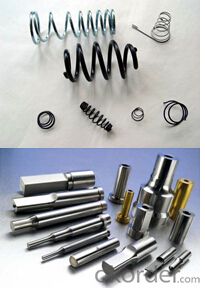
FAQ
1.What's your MOQ?
25MT, it is for one container.
2.Do you have QC teams?
Yeah, sure, our QC team is very important, they will keep the quality control for our products.
3. What's your normal delivery time?
Our delivery time about 10-20days for standard sizes, if you have other requirements like hardness and width ,it is about 20-40days. But don't worry ,we also try our best for the delivery time ,because time longer and our cost is higher.
4.Are the products tested before shipping?
Yes, all of our PPGI and GI was qualified before shipping. We test every batch every day.
- Q: 7850kg/cu.m density is typical for all type of steel? like reibar, I- beam and so on
- 90% of the steels used today are plain mild carbon steels consisting of iron with less than 1% carbon content and as such have a density of about 7750 kg/cubic meter. Some special steels which have a significant percentage of alloying elements such as chrome or manganese or other elements will have greater density bringing the steel up to about 8000 kg / cubic meter. There are a greater many factors influencing the exact density of a steel. Even for steels of exactly the same content of iron , carbon and other alloying elements, there may be a difference ( very small mind you ) in density due to work hardening. The difference in this case is due to movement of dislocations which become locked in the grain boundaries and this forms a more dense crystal structure. For this same reason, the theoretical density of steel (which does not take into account dislocations) is greater than the measured density of steel.
- Q: How are steel coils used in the manufacturing of metalworking tools?
- The manufacturing of metalworking tools heavily relies on steel coils, which are an essential component in the process. These coils, typically made from high-quality steel, serve various purposes at different stages of production to produce a variety of metalworking tools. Blades and cutting tools, for instance, are one primary application of steel coils in metalworking tool manufacturing. These coils are usually cut into specific lengths and then shaped and sharpened to create blades used for cutting, shaping, and milling different metals. The use of high-quality steel in these coils guarantees durable, strong blades capable of withstanding the demanding conditions of metalworking processes. Another use of steel coils in metalworking tool manufacturing is for the production of drill bits and other types of tooling. The coils are shaped and machined to achieve the desired size and shape of the tool, followed by a hardening and tempering process to enhance their strength and durability. This ensures that the resulting tools can endure the high-speed drilling and cutting operations involved in metalworking. Additionally, steel coils are utilized to construct the bodies and handles of metalworking tools. The coils are typically formed into the desired shape and size using various techniques like bending, rolling, and stamping. These formed pieces are then welded or fastened together to create the final structure of the tool. The high-quality steel used in the coils ensures that the resulting tool bodies and handles possess strength, rigidity, and the ability to withstand the forces and vibrations associated with metalworking operations. In summary, steel coils are crucial in the manufacturing of metalworking tools as they are used to create blades, drill bits, bodies, and handles. These coils provide the necessary strength, durability, and precision required in metalworking processes. Considered an essential raw material, steel coils enable the production of high-quality, reliable, and efficient metalworking tools.
- Q: How are steel coils used in the production of HVAC ductwork?
- Steel coils are used in the production of HVAC ductwork as they are rolled into thin sheets and then formed into the desired shape to create the ducts. The coils provide strength and durability to the ductwork, ensuring it can withstand the high temperatures and pressure of air conditioning and heating systems.
- Q: So what's harder gold or steel
- Steel Gold is a soft metal, that's why people bite it to make sure it is real.
- Q: How do steel coils contribute to the energy storage industry?
- Steel coils contribute to the energy storage industry in several ways. Firstly, steel coils are used in the manufacturing of energy storage systems such as batteries. The steel casing provides structural support and protection to the battery cells, ensuring their safety and longevity. Without steel coils, the batteries would be more vulnerable to damage and would not be able to function effectively. Additionally, steel coils are essential in the construction of flywheels, which are another form of energy storage technology. Flywheels store energy by spinning a rotor at high speeds and then releasing the stored energy when needed. Steel coils are used to create the rotor, which needs to be strong, durable, and capable of withstanding the high rotational forces. The magnetic properties of steel also help to enhance the efficiency of energy transfer within the flywheel system. Furthermore, steel coils are used in the production of compressed air energy storage (CAES) systems. CAES systems store energy by compressing air and then releasing it to generate electricity when required. Steel coils are utilized in the construction of the air storage chamber, ensuring its integrity and preventing any leakage or damage. The robustness of steel coils makes them ideal for withstanding the high pressures involved in the compression process. In summary, steel coils play a crucial role in the energy storage industry by providing structural support, durability, and protection to various energy storage technologies. Whether it is in batteries, flywheels, or CAES systems, steel coils contribute to the efficient and safe storage of energy, helping to promote the development and adoption of sustainable energy solutions.
- Q: Can steel coils be stored in a corrosive environment?
- No, steel coils should not be stored in a corrosive environment as it can cause damage and corrosion to the coils, reducing their quality and durability over time.
- Q: How are steel coils inspected for thickness variations?
- Steel coils are inspected for thickness variations using non-contact measurement techniques such as laser or ultrasonic sensors. These sensors are capable of accurately detecting and measuring the thickness of the steel coils at various points along their length. The collected data is then analyzed to identify any variations in thickness and ensure the quality and consistency of the steel coils.
- Q: I'm trying to put together a small structure using galvanized steel electrical conduit (3/4) and I can't seem to find a T-junction conduit coupler anywhere. I'm wondering if I could weld the tubing together, but I'm not sure if I can weld galvanized steel. Also, if I can weld them, is there any special technique that I need to use outside of regular acetelene/oxygen torch and solder?
- Conduit is made from low carbon steel. Then the galvanized coating is applied. The fumes from the coating are poisonous when heated. So your choices are to remove the coating then do your heating. They can be soldered, brazed and welded. It all depends how strong you want the joint and how high a temperature used. If you use silver solder the joint must be very tight. If you use lead solder a flux must be used same as brazing. Welding is the strongest and the melting temperature of steel is about 2600 degrees.
- Q: What's the difference between hot rolled coil and hot-rolled carbon thin steel coil?
- Hot rolled coil is used for continuous casting slab or as raw material, after reheating furnace heating, descaling into the roughing mill of high pressure water, roughing material by cutting head, tail, and then enter the finishing mill, the implementation of the computer controlled rolling, after finishing through the laminar cooling (computer controlled cooling rate and coiling) reel, a straight hair volume. Hair straightenerrollhead, tail tongue shapeand thefishtail shape, thickness, width of poor accuracy, edgehaswavy, folding, tower and other defects. The volume is heavy. (general management industry likes to use. )
- Q: Can steel coils be coated with anti-tampering materials?
- Yes, steel coils can be coated with anti-tampering materials. These materials provide an additional layer of protection against tampering and unauthorized access to the steel coils.
Send your message to us
Alloy Rolled Steel Coil for Machinery Parts
- Loading Port:
- Tianjin
- Payment Terms:
- TT OR LC
- Min Order Qty:
- 25 m.t.
- Supply Capability:
- 10000 m.t./month
OKorder Service Pledge
OKorder Financial Service
Similar products
Hot products
Hot Searches
Related keywords
